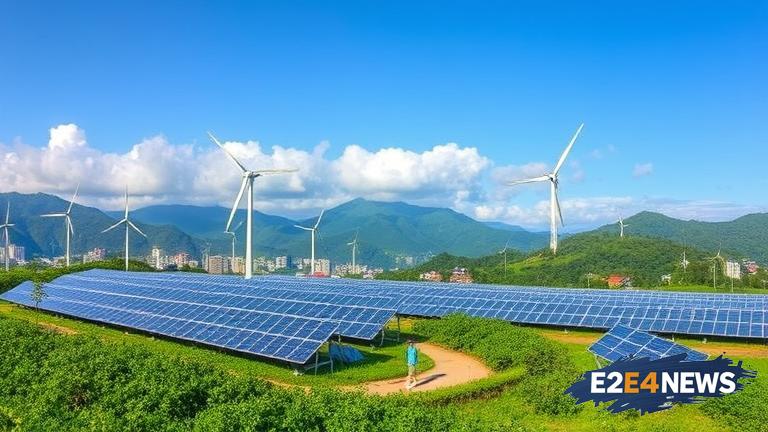Taiwan has been actively promoting renewable energy in recent years, with a focus on reducing its reliance on fossil fuels and mitigating the impact of climate change. The government has set ambitious targets to increase the share of renewable energy in the country’s energy mix, with a goal of reaching 20% by 2025. To achieve this, Taiwan has been investing heavily in solar and wind power, with numerous large-scale projects underway across the island. The Taiwan Renewable Energy Development Act, passed in 2019, has provided a framework for the development of renewable energy, including incentives for companies and individuals to invest in renewable energy technologies. The act also aims to promote energy conservation and reduce greenhouse gas emissions. In addition to solar and wind power, Taiwan is also exploring other forms of renewable energy, such as hydroelectric and geothermal power. The government has also launched initiatives to promote the use of electric vehicles, with the aim of reducing air pollution and greenhouse gas emissions from transportation. Furthermore, Taiwan has been working to improve energy efficiency, with measures such as smart grids and energy-efficient buildings. The country has also been actively participating in international efforts to address climate change, including the Paris Agreement. Taiwan’s renewable energy efforts have been recognized globally, with the country being ranked as one of the top performers in the Asia-Pacific region in terms of renewable energy development. Despite the progress made, there are still challenges to be addressed, including the need for greater investment in renewable energy infrastructure and the development of more effective policies to support the transition to a low-carbon economy. The government has also faced criticism for its handling of environmental impact assessments for large-scale renewable energy projects. Nevertheless, Taiwan remains committed to its renewable energy goals, with the government continuing to promote the development of sustainable energy sources. The private sector has also been playing a crucial role in Taiwan’s renewable energy efforts, with companies such as Taiwan Power Company and China Steel Corporation investing heavily in renewable energy technologies. Non-governmental organizations (NGOs) have also been actively involved in promoting renewable energy and sustainability in Taiwan. The country’s renewable energy efforts have also been driven by public demand, with many Taiwanese citizens expressing concern about the impact of climate change and the need for sustainable development. In response to these concerns, the government has launched public awareness campaigns to promote the importance of renewable energy and sustainability. Taiwan’s renewable energy efforts are also closely tied to its economic development goals, with the government seeking to create new industries and job opportunities in the renewable energy sector. The country’s strategic location in East Asia also makes it an important player in regional efforts to promote renewable energy and address climate change. Overall, Taiwan’s commitment to renewable energy and sustainability is a key aspect of its efforts to promote economic development, reduce its environmental impact, and address the global challenge of climate change. The country’s progress in this area will be closely watched in the coming years, as it seeks to achieve its ambitious renewable energy targets and become a leader in sustainable development. Taiwan’s experience in promoting renewable energy can also provide valuable lessons for other countries seeking to transition to a low-carbon economy. The government’s efforts to promote public awareness and engagement on renewable energy issues have also been recognized as a key factor in the country’s success in this area. As Taiwan continues to move forward with its renewable energy efforts, it is likely that the country will face new challenges and opportunities, including the need to integrate renewable energy into the grid and promote the development of new technologies. Despite these challenges, Taiwan remains committed to its goal of becoming a leader in renewable energy and sustainability, and its efforts in this area are likely to have a lasting impact on the country’s development and the global environment.





